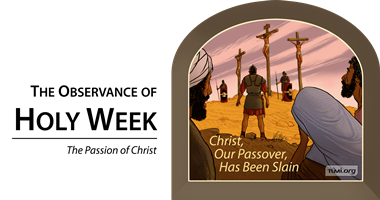Visit the full Observance of Holy Week page
“In the ancient church the three days [of the Paschal Triduum] started on Thursday evening and ended with the great Paschal vigil of Saturday night. These services are called the Paschal Triduum [or, the Three Great Days] ... They are the most holy, solemn, and serious days of the entire year. For in these days we experience and encounter our own destiny in the destiny of Christ ignominious death and burial and in his triumphant resurrection from the dead.” Robert Webber, Ancient Future Time. Grand Rapids: Baker Books, 2004, p. 125. Holy Week recalls the events of Christ's suffering and death. We recall his triumphant entry into Jerusalem on Palm Sunday, his giving of the commandments on Maundy Thursday, his crucifixion on Good Friday, and the end the week with the solemn vigil of Saturday night (Holy Saturday) before Easter Sunday.
Palm Sunday: The Sunday before Easter which commemorates the Triumphal Entry of Christ (Jn. 12:12-18).
Maundy Thursday: The Thursday before Easter which commemorates the giving of the New Commandment and the Lord’s Supper prior to Christ’s Death (Mk. 14:12-26; John 13). [From the Latin mandatum novarum which means “new commandment” (John 13:34)]
Good Friday: The Friday before Easter which commemorates the crucifixion of Christ (John 18-19). [Listen to Dr. Davis teach our Good Friday service, and ponder the wonder of God's love displayed on the Cross for our salvation.]
Holy Saturday: The day before Easter which commemorates the burial of Jesus before his resurrection on Sunday (John 18-19).
Again, Holy Week is Lent’s final week. As a season, Lent starts on Ash Wednesday and ends Saturday of Holy Week, with a vigil on Holy Saturday. In the ancient church, new converts used Lent’s entire period to pray, fast, and repent as intense preparation for baptism on Easter morning. Today, we walk the way of the Cross with Jesus, reflecting on his lowliness and humiliation. The services of Thursday, Friday, and Saturday (called the Paschal Triduum) represent the most solemn days of the Church year. Here we clearly see the meaning of our baptism in Christ–being united with him in his suffering, death, burial, and resurrection from the dead.
